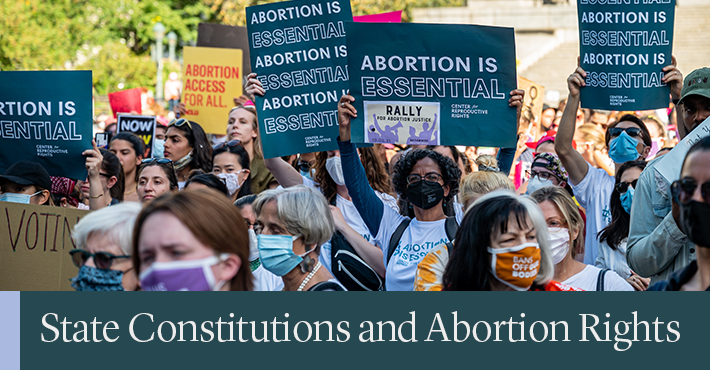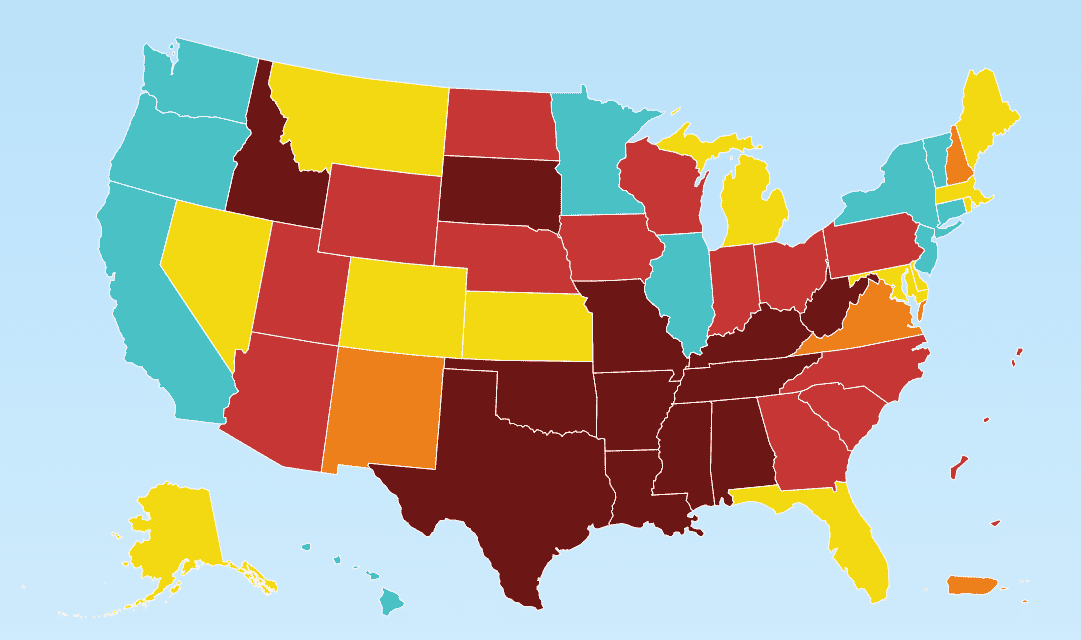South Carolina Supreme Court Affirms Abortion as a Protected Privacy Right Under the State’s Constitution
Court permanently blocks six-week abortion ban, calling it an “unreasonable restriction upon a woman's right to privacy.”

The South Carolina Supreme Court today agreed with arguments brought by the Center for Reproductive Rights and its partners that a ban on abortion at six weeks violates the state constitution’s guarantee to the right to privacy.
The court’s ruling came after abortion providers challenged a South Carolina law banning abortion after approximately six weeks of pregnancy. The ruling, in Planned Parenthood South Atlantic v. State of South Carolina, et al., permanently blocks the law and allows doctors to continue providing abortion care to patients beyond the earliest stages of pregnancy.
“Today’s ruling is especially significant because it builds on the body of jurisprudence throughout the country holding that state constitutions independently recognize and protect abortion rights.”
–Genevieve Scott, senior counsel
The lead opinion states: “The Act cannot withstand the clear directive of our state constitution—that “unreasonable invasions of privacy shall not be violated . . . .” [I]t forecloses abortion in South Carolina for many pregnant women who may seek it . . . . By leaving no room for many women to exercise that choice, the Act prohibits certain South Carolinians from making their own medical decisions.”
Nancy Northup, the Center’s president and CEO, said in a statement, “Today’s decision means that the right to make deeply personal health care decisions will remain protected in South Carolina—an immense victory for South Carolinians and the entire region.”
South Carolina’s six-week abortion ban took effect June 27, shortly after the U.S. Supreme Court ruling eliminating the constitutional right to abortion. The South Carolina Supreme Court temporarily blocked the law on August 17 and heard arguments in the case on October 19.
The plaintiffs in the case are represented by Planned Parenthood Federation of America, the Center for Reproductive Rights, and the law firm Burnette Shutt & McDaniel.
Without Federal Protections, State Constitutions Are Critical to Protecting Abortion Rights
Without a federal constitutional right to abortion, state constitutions and courts are playing an increasingly critical role in protecting and advancing abortion rights. Not only are they able to offer alternative and expanded legal grounds for protecting those rights, but they also shield access to abortion in highly restrictive parts of the country—such as in the South.
South Carolina, long considered hostile to abortion rights before today’s ruling, is surrounded by numerous states hostile to abortion rights, making abortion care in the South extremely difficult, or in some cases, impossible to access.
Read more.
State Constitutions and Abortion Rights
Center report about building protections for reproductive autonomy.
“Today’s ruling is especially significant because it builds on the body of jurisprudence throughout the country holding that state constitutions independently recognize and protect abortion rights,” said Genevieve Scott, senior counsel for the Center. “States have unique constitutions that can provide broad protections for reproductive autonomy. Considering the robust privacy and equal protection clauses in South Carolina’s constitution, the state supreme court clearly made the right decision today.”
For decades, the Center has brought cases in state courts to build strong protections for abortion rights at the state level, independent of federal law. In a recent report, “State Constitutions and Abortion Rights: Building protections for reproductive autonomy,” the Center outlines states in which high courts have recognized that their state constitutions protect abortion rights and access independently from and more strongly than the U.S. Constitution or have struck down restrictions that were upheld by the U.S. Supreme Court.
The Center and its partners have filed numerous cases against state abortion bans that states have attempted to enforce since the U.S. Supreme Court’s ruling in June 2022. Some of those cases have centered around state constitutional protections such as those guaranteeing rights to privacy, liberty, and equal protection under the law—protections that the Center and its partners have argued extend to abortion rights.
“Dobbs does not control, nor even shed light on, our decision today since the South Carolina Constitution expressly includes a right to privacy.”
–South Carolina Supreme Court lead opinion
More excerpts from today’s lead opinion by the South Carolina Supreme Court:
- “We hold that the decision to terminate a pregnancy rests upon the utmost personal and private considerations imaginable, and implicates a woman’s right to privacy. While this right is not absolute, and must be balanced against the State’s interest in protecting unborn life, this Act, which severely limits—and in many instances completely forecloses—abortion, is an unreasonable restriction upon a woman’s right to privacy and is therefore unconstitutional.”
- “We reject Respondents’ argument to limit the right to privacy guaranteed in our constitution merely because the words used do not specifically mention medical care or bodily autonomy. This narrow interpretation would render the words “and unreasonable invasions of privacy” superfluous.”
- “A critical part of the Dobbs Court’s justification for overruling Roe was that Roe “held that the abortion right, which is not mentioned in the Constitution, is part of the right to privacy, which is also not mentioned.” Id. at 2245 (emphasis added). Recognizing that Roe was overturned partially based on its reliance on an unmentioned and hence arguably nonexistent constitutional right to privacy, Dobbs does not control, nor even shed light on, our decision today since the South Carolina Constitution expressly includes a right to privacy.”
- “[T]he actual scientific data demonstrates that the guise of an “informed choice” is merely an illusion in many instances because women typically do not realize they are pregnant until around six weeks, precisely when the Act bans this medical procedure.”
Large swaths of the U.S. are without access to abortion care.
Explore the Center’s “After Roe Fell: Abortion Laws by State” tool to learn more about each state’s abortion laws and policies.
Read more.
- Ruling by the South Carolina Supreme Court, 01.05.23
- Case background: Planned Parenthood South Atlantic v. State of South Carolina, et al.



